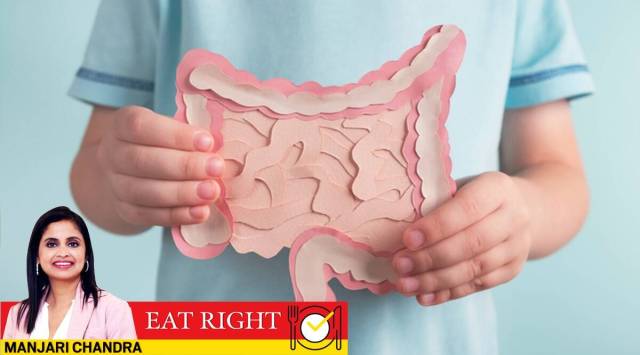Eat Right: If you don’t get enough sleep, it might be time for a gut makeover
There’s a two-way relationship between gut health and sleep deprivation. Here’s how you can fix it.
 Is there a relation between sleeping right and a healthy gut? Expert explains. (Source: Getty Images/Thinkstock)
Is there a relation between sleeping right and a healthy gut? Expert explains. (Source: Getty Images/Thinkstock)A universal physiological need, all species require quality sleep for running, maintaining, and repairing different functions of the body. Sleep deprivation or disorders may lead to metabolic disorders, thereby raising the risk of obesity, diabetes, hypertension, depression, and cardiovascular conditions, such as stroke and heart attack.
In children, compromised sleep in terms of quality and/or quantity is associated with behavioural and academic problems, weight abnormalities, and gut problems.
Buy Now | Our best subscription plan now has a special price
Effects of inadequate sleep on gut health
Studies suggest a negative effect of prolonged sleep disruption or loss on the composition of the intestinal microbiota. According to the research, even a short-term sleep loss may increase the Firmicutes and Bacteroidetes (F/B) ratio, which is associated with an increased risk of obesity and associated disorders.
Similarly, circadian rhythm disruption is found to negatively affect sleep and cause gut microbiota imbalance through the brain-gut–microbiome axis (MGBA), suggesting a bidirectional association between sleep and gut health.
The MGBA refers to a bidirectional axis that allows constant communication between the gut and the brain. In simple words, sleep and gut health are interrelated. Therefore, it is important to take care of both to ensure they work in tandem and you can enjoy both great gut health and sound sleep.
The strategies like making healthy lifestyle adjustments such as administration of prebiotics, personalised diet, and “psycobiotics” may help address the intestinal dysbiosis (change in the number of microbiota) associated with sleep disorders.
Let’s discuss the effective ways to establish a harmonious relationship between gut health and sleep:
Boosting microbiota for quality sleep
Experts suggest time-restricted feeding to promote microbiota balance. It involves a fasting period of 12 hours between dinner and breakfast, which allows sufficient time for your gut to stimulate gut-bacteria regrowth.
Diet is also an important component of gut health. Ample intake of a wide variety of vegetables and fruits containing phytochemicals and fibre can help promote diverse species of gut-healthy bacteria.
Consumption of probiotic foods and prebiotic foods is important to plant beneficial bacteria in the gut and to feed gut bacteria respectively.
Researchers have also developed a dietary programme called the ‘gut makeover’ to improve the diversity and health of the microbiome. In the programme, the participants are advised to follow a dietary pattern for four weeks.
The first half (1-2 weeks) involves:
- Observing a 12-hour overnight fast between dinner and breakfast, with only water allowed during the course.
- Consuming 3 main meals per day, with no snacks between.
- Eat five uncooked vegetables and two fruits per day.
- Protein intake in the form of nuts, seeds, or other sources with each meal.
- Consumption of 20 to 30 different types of plants including vegetables, fresh herbs, and fruits over a span of a week.
- Preferring coconut or extra virgin olive oil for cooking.
- Ensuring approximately 20 chews per mouthful.
- Not restricting calories.
In the second half of the plan (weeks 2–4), the participants:
- Could eat ghee and butter as well.
- Take probiotic foods.
- Eat more prebiotic vegetables like bananas, onions, garlic, etc.
- In addition, the participants are asked to exclude refined sugars, grains, pulses, alcohol, caffeine, and dairy (after 2 weeks if no adverse symptoms are seen) from their diet throughout the four weeks.
- The gut makeover is a research-based strategy developed to improve the microbiome and gut permeability. Researchers found that the strategy may prove effective in weight loss with health benefits that were primarily related to digestive health such as alleviating bloating, constipation, chronic acid reflux, loose stools, etc.
Stick to a fixed sleep schedule
In relation to circadian rhythm and sleep loss, we advise you to follow a sleep schedule that allows you to have a sound sleep of at least seven hours and not more than eight hours. Make sure you go to bed and get up at the same time daily (including weekends) to reinforce the sleep-wake cycle of your body.
If you are not able to fall asleep within about 20 minutes of getting the bed, you can try something relaxing, such as reading or listening to soothing music. Once you start feeling tired, get back to bed and try to sleep. You may have to repeat the same until you maintain a sleep schedule and wake-up time. Keeping your bedroom dark, cool and quiet may also help fall asleep fast.
Allow time for physical activity in your daily routine
Regular physical activity has multiple benefits. Apart from maintaining the optimum functioning of your body, it also helps you enjoy quality sleep. However, it is advised to avoid strenuous activities around bedtime.
Avoid or limit daytime naps
Daytime naps may compromise nighttime sleep. However, the people working nights may have to make necessary adjustments in their sleep schedules. But remember, nights are the best time to get quality sleep.
What you eat and drink may also affect your sleep
Avoid heavy meals within a few hours before bedtime. Also, don’t go to bed hungry. Intake of caffeine, nicotine, and alcohol at bedtime may also interfere with sleep.
Manage stress
Stress is a major deterrent to enjoying quality sleep. Relaxation techniques like meditation, delegating tasks, setting priorities, and getting organised can help in managing stress.
Here are some effective ways that can help you break the vicious cycle of sleep disruption and unhealthy gut. However, expert consultation is advised if problems related to sleep or unhealthy gut continue to bother you for a long.
Manjari Chandra is a consultant, functional nutrition and nutritional medicine, Manjari Wellness, New Delhi. Her column appears every fortnight.
For all the latest Parenting News, download Indian Express App.
- 01
- 02
- 03
- 04
- 05































